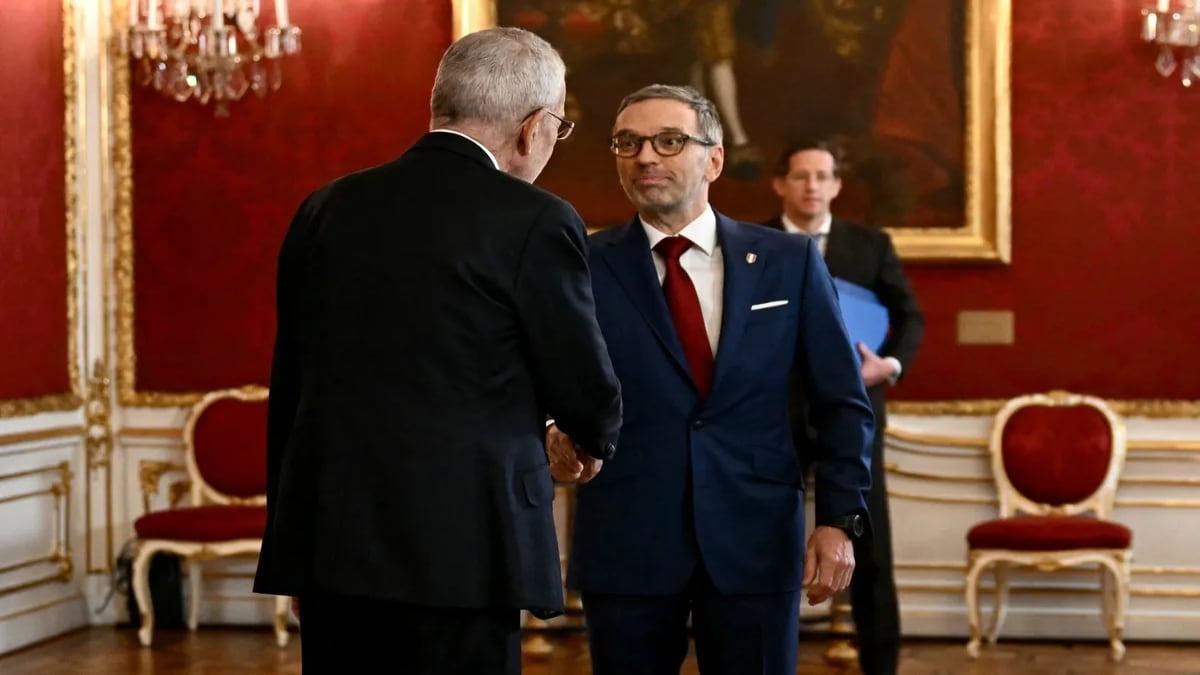Austria’s President Alexander Van der Bellen has tasked far-right leader Herbert Kickl to form the government, bringing the Freedom Party chief closer to the chancellorship, according to a Bloomberg report.
“I have not taken this step lightly,” Bloomberg quoted Van der Bellen as saying to reporters on Monday.
“I will continue to ensure that the principles and rules of our constitution will be upheld,” he added.
According to the report, despite their earlier commitment not to collaborate with Kickl, members of the conservative People’s Party changed their stance on Sunday after Chancellor Karl Nehammer resigned following his inability to form a centrist coalition.
The 56-year-old Kickl met with Van der Bellen in Vienna on Monday to discuss the formation of a government, while approximately 500 people gathered nearby to protest, added the report.
If Kickl assumes power, it would be the first time a far-right party has led Austria since World War II, contributing to a rising wave of nationalism across Europe, reported Bloomberg.
With two weeks until Donald Trump takes office, Germany is preparing for February elections where the far-right is expected to gain ground, while France faces electoral gridlock after a leftist alliance and Marine Le Pen’s far-right National Rally outperformed others last June.
The Freedom Party’s campaign has focused on pro-Russian, anti-immigrant, and climate-skeptic positions.
Kickl, a polarising figure in Austria’s population of about nine million, is one of the country’s least-liked politicians yet has led his party close to power. He staunchly opposed a vaccine mandate during the pandemic and supported far-right activists advocating for mass deportations. He has pledged to collaborate with Hungary’s controversial Prime Minister Viktor Orban.
For decades, the People’s Party sought to keep the Freedom Party at a distance by forming coalitions with rival parties or including it only as a junior partner to maintain control. However, that strategy began to falter after the September elections, where the Freedom Party increased its seats from 26 in 2019 to 57, boosting its vote share by nearly 13 points. In contrast, the People’s Party dropped to 51 seats, losing 20.
While Austria’s other parties attempted to unite to keep the Freedom Party out of government — a tactic dubbed a “Kickl prevention strategy” by its leader—Nehammer’s resignation on Saturday changed the landscape. After failing to secure a coalition with the Social Democrats and liberal NEOS, Nehammer’s interim successor, People’s Party secretary Christian Stocker, quickly expressed readiness to negotiate with the Freedom Party.
This shift reflects the People’s Party’s declining public support and Nehammer’s inability to attract voters since taking over from former political star Sebastian Kurz in 2021. Moreover, influential provincial leaders and a faction of industrialists within the People’s Party had been advocating for a partnership with the far right.
“Since yesterday, the situation looks different,” Bloomberg quoted Stocker, until recently a sharp critic of the Freedom Party, as saying on Sunday.
“This country needs a stable government right now and we cannot keep losing time in election campaigns,” added Stocker.
Marcus How, a geopolitical risk analyst at VE Insight in Vienna, told Bloomberg that the likelihood of a Freedom Party-People’s Party coalition has risen considerably, though it is not guaranteed.
“Kickl holds most of the cards, and can therefore afford to be maximalist in his negotiating stance,” How was quoted as saying.
“If the negotiations fail, he can simply lean back and fight an election which the polls indicate would bring further landslide gains” for the Freedom Party, he added.
Unlike younger far-right groups in Europe, the Freedom Party has been active in Austria for decades. Kickl has previously referred to Van der Bellen, 80, as a “senile mummy.” During his tenure as interior minister, some foreign intelligence agencies were wary enough of him to halt the sharing of sensitive information with Austria.
To become chancellor, Kickl will need to align his political views with conservatives, who maintain significant influence in Austria’s economy and society, reported Bloomberg.
Austria’s new leaders also face serious challenges for the nation’s industrial sector due to years of high wage growth and rising energy prices, which have impacted competitiveness. After two years of economic contraction, Austria must also implement billions in budget consolidation measures to avoid penalties from the European Union.
In a statement on Sunday, Kickl said he would focus on affordable living, justice, security, freedom, and peace.
“We bear no responsibility for wasted time, chaotic conditions and the enormous erosion of trust,” Kickl stated on Facebook. “Clearly, the Freedom Party has been and is the only stable point in Austrian politics.”
With inputs from agencies
